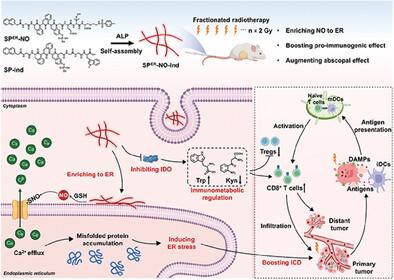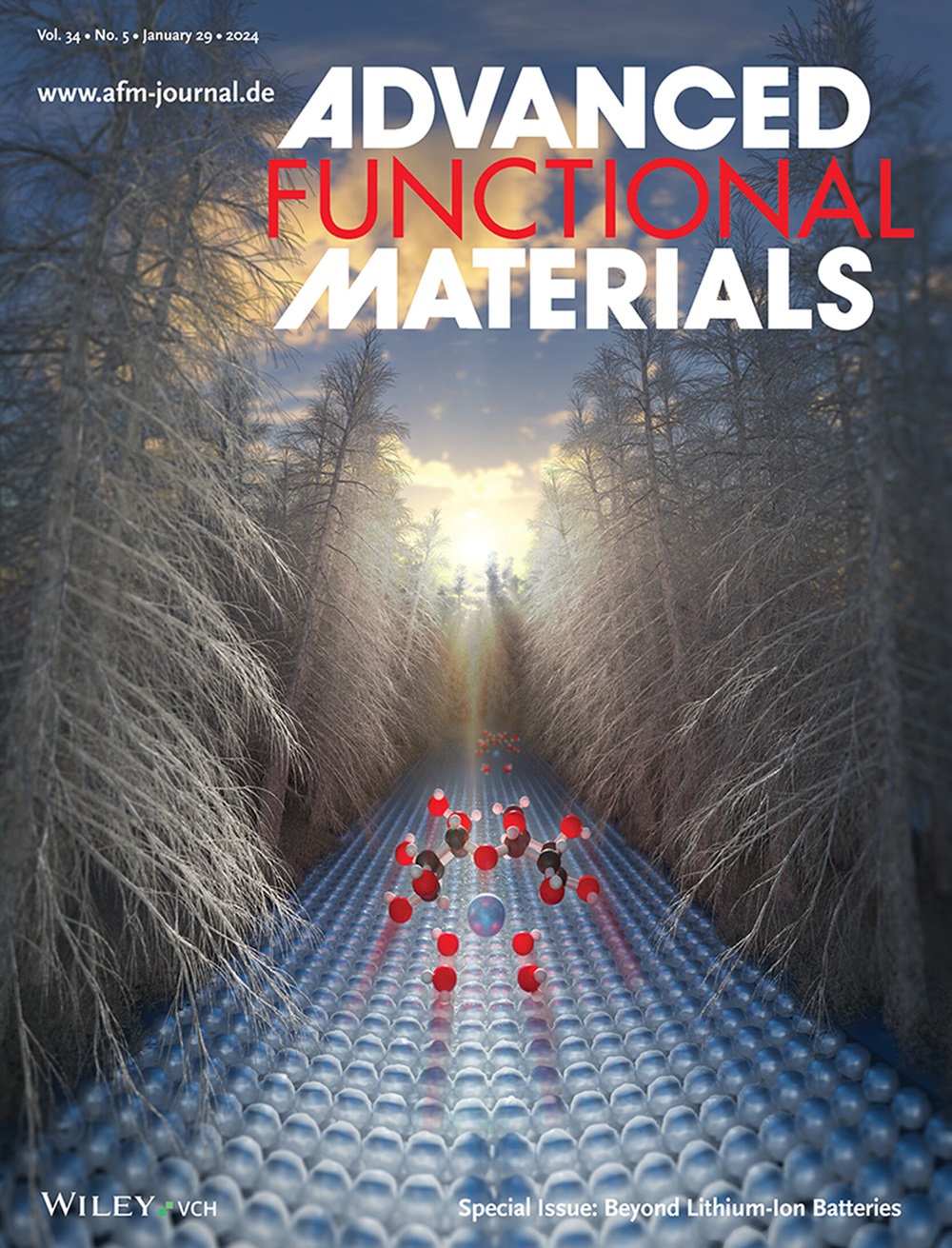A Peptide Nanoregulator Enriched at the Endoplasmic Reticulum for Boosting Fractionated Radiotherapy-Mediated Antitumor Immune Response
IF 18.5
1区 材料科学
Q1 CHEMISTRY, MULTIDISCIPLINARY
引用次数: 0
Abstract
Fractionated radiotherapy (FRT), typically delivering low-dose radiation of 2 Gy per fraction, has been used as the main clinical treatment regimen for various tumors. However, its therapeutic efficacy is severely hindered by inadequate pro-immunogenic effect and ionizing radiation-induced immunosuppression. Herein, a peptide nanoregulator (SPER-NO-Ind) is constructed from self-assembling peptides that can enrich nitric oxide (NO) at the endoplasmic reticulum (ER) and inhibit indoleamine 2,3-dioxygenase (IDO) to enhance FRT-mediated antitumor immunity and reinforce treatment outcomes. SPER-NO-Ind triggered S-nitrosylation of the ryanodine receptor by ER-specific enrichment of NO, triggering the release of Ca2+ within ER and induction of robust ER stress. The combination of 2 Gy γ-radiation with SPER-NO-Ind induced intense immunogenic cell death (ICD) in ER-stressed 4T1 cells. Furthermore, this nanoregulator inhibited IDO and decreased kynurenine production, reversing FRT-induced immunosuppressive effects. The combined application of FRT and SPER-NO-Ind demonstrated superior efficacy in suppressing breast tumor growth, amplifying abscopal effects, and inhibiting metastasis in mice. The SPER-NO-Ind treatment achieved a 40% decrease in the total radiation dose while securing equivalent tumor suppression efficacy. Collectively, the work presents a facile approach to augment the efficacy of fractionated radiotherapy for tumors, opening up a new way to enhance the antitumor immune response of radiotherapy.

一种富集于内质网的多肽纳米调节剂可增强分次放疗介导的抗肿瘤免疫反应
分次放射治疗(FRT)通常以每分次 2 Gy 的低剂量放射线作为治疗各种肿瘤的主要临床方案。然而,由于促免疫效应不足和电离辐射引起的免疫抑制,其疗效受到严重影响。本文利用自组装肽构建了一种肽纳米调节剂(SPER-NO-Ind),它能在内质网(ER)富集一氧化氮(NO)并抑制吲哚胺-2,3-二氧化酶(IDO),从而增强 FRT 介导的抗肿瘤免疫,巩固治疗效果。SPER-NO-Ind通过ER特异性富集NO引发Ryanodine受体的S-亚硝基化,引发ER内Ca2+的释放并诱导强大的ER应激。2 Gy γ射线与SPER-NO-Ind的结合可诱导ER应激的4T1细胞发生强烈的免疫性细胞死亡(ICD)。此外,这种纳米调节剂还能抑制 IDO 并减少犬尿氨酸的产生,从而逆转 FRT 诱导的免疫抑制效应。FRT和SPER-NO-Ind的联合应用在抑制乳腺肿瘤生长、扩大脱落效应和抑制小鼠转移方面表现出卓越的疗效。SPER-NO-Ind 治疗使总辐射剂量减少了 40%,同时确保了同等的肿瘤抑制效果。总之,这项研究提出了一种提高肿瘤分次放疗疗效的简便方法,为增强放疗的抗肿瘤免疫反应开辟了一条新途径。
本文章由计算机程序翻译,如有差异,请以英文原文为准。
求助全文
约1分钟内获得全文
求助全文
来源期刊

Advanced Functional Materials
工程技术-材料科学:综合
CiteScore
29.50
自引率
4.20%
发文量
2086
审稿时长
2.1 months
期刊介绍:
Firmly established as a top-tier materials science journal, Advanced Functional Materials reports breakthrough research in all aspects of materials science, including nanotechnology, chemistry, physics, and biology every week.
Advanced Functional Materials is known for its rapid and fair peer review, quality content, and high impact, making it the first choice of the international materials science community.
 求助内容:
求助内容: 应助结果提醒方式:
应助结果提醒方式:


